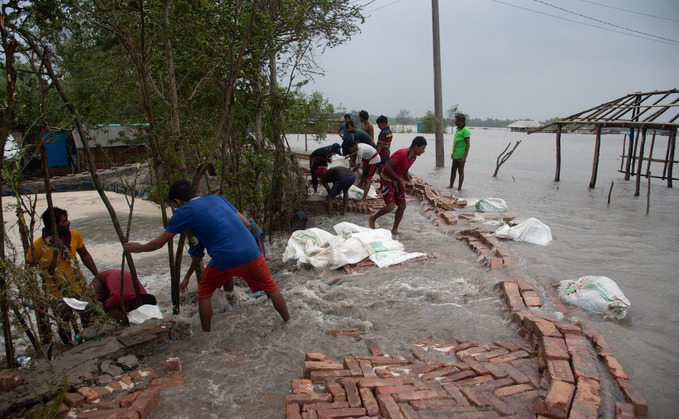A severe cyclonic storm in the Khulna District, Bangladesh | Credit: iStock
Developed nations collectively mobilised $115.9bn in climate finance for developing countries in 2022, the first time thee $100bn collective annual goal has been met
Developed countries finally achieved their annual goal to collectively mobilise $100bn in climate finance for developing nations in 2022, albeit two years behind schedule, according to the Organisation for Economic Co-operation and Development (OECD).
In its seventh annual review of progress towards the $100bn goal published yesterday, the intergovernmental organisation counted $115.9bn of climate finance in total which it said had flowed from developing countries across 2022, marking a significant increase on the $89.6bn raised the previous year.
The 2022 figures represent the first time richer nations have fulfilled their long-held pledge to mobilise $100bn annually from 2020 onwards for developing nations to reduce their emissions and adapt to rising temperatures and extreme weather, as had been agreed through the Paris Agreement process.
Prior to 2022, richer nations' continued failure - particularly in 2020 and 2021 - to meet the $100bn climate finance goal that they first agreed to back in 2009 had seen the issue become a major flashpoint at annual UN climate talks. The issue has frayed trust between developed and developing nations, threatening to undermine negotiations over a raft of crucial climate issues surrounding the Paris Agreement, while also continuing to leave billions of people at risk from increasingly extreme and volatile weather driven by rising temperatures.
But in its latest assessment yesterday, the OECD said the level of climate finance raised in 2022 had surpassed expectations, reaching a level that had not been anticipated to be reached before 2025.
OECD secretary-general Mathais Cormann hailed the achievement of the totemic goal as a landmark moment that had potential restore trust between developed and developing nations.
"Exceeding this annual commitment materially by more than 15 per cent is an important and symbolic achievement which goes some way towards making up for the two-year delay, which should help build trust," he said. "We encourage developed countries to keep up the momentum, also to leverage it further with additional policy efforts to boost private climate finance. It will be important to sustain this level of elevated support through to 2025 while also increasing our ambition for the new post-2025 goal."
The OECD's conclusions come as countries gear up for critical climate finance talks at the COP29 Climate Summit in Azerbaijan's capital Baku this autumn, where they are tasked with agreeing a new, annual money-raising target for after 2025, known as the New Collective Quantified Goal on climate finance in the UN jargon.
In a separate report published by the OECD this week, it sets out a range of options for policymakers to consider when finalising the New Collective Quantified goal on climate finance.
"Multilateral providers and the private sector will be key to further bridging the investment gap, notably in areas such as clean energy, agriculture and resilience," Cormann said. "For the post-2025 period, the scope and design of the New Collective Quantified Goal on climate finance must be more comprehensive and effective than the existing goal by optimising the roles of different actors, finance sources, and policy incentives in order to address the scale and range of climate-related finance needs."
The OECD'S 2022 climate finance data shows that public funds, from both bilateral and multilateral channels, continue to make up the bulk of climate finance, accounting for 80 per cent of the total raised over the year.
Loans continue to represent the lion's share of public climate finance, especially for multilateral development banks, which typically finance large infrastructure projects, the OECD noted. However, grants are being prioritised in lower-income countries, it noted.
Private climate finance, on the other hand, reached £21.bn in 2022, jumping by £7.5bn, or 52 per cent, after "several years of relative stagnation", according to the figures.
The figures also show an uptick in climate finance destined for adaptation action, with the overall amount of funds for adaptation rising to $32.4bn in 2022, or three times the level recorded in 2016, and a significant increase on the £18.8bn raised in 2019. Based on these figures for 2022, it means developed countries are around halfway towards meeting their pledge – set out in the COP26 Glasgow Climate Pact in 2021 - to double the provision of adaptation finance between 2019 by 2025.
Melanie Robinson, global climate, economics and finance director at the US non-profit the World Resources Institute (WRI), said it was "encouraging news" that the climate finance goal had been fully met in 2022.
However, she noted that funding needed to tackle the climate crisis went "well beyond" $100bn a year, as she stressed that international public finance would play a "lynchpin role" in developing countries' efforts to tackle and adapt to climate change.
"Addressing this major funding gap is the top priority when the world comes together at the COP29 summit to negotiate a new global goal for climate finance for the first time in 15 years," she said. "Success in Baku goes beyond just securing a much larger top-line dollar figure. For instance, it is crucial that the new climate finance goal ensures that funding is accessible and doesn't burden developing countries with more unsustainable debt. And there must be strong measures in place to report progress, hold countries accountable for meeting their obligations on time and increase transparency of all climate finance. "
Robinson added the outcome of negotiations in Baku would have "immediate knock-on effects" given that the Summit is set to come just months before countries are required to submit a fresh round of national climate plans - or nationally determined contributions (NDCs) in the UN jargon - under the Paris Agreement.
"If countries deliver an ambitious climate finance goal in Baku, developing countries in need of international climate finance will be in a much better position to put forward bold climate commitments and help keep global temperatures in check," she said.
Meanwhile Andreas Sieber, associate director of global policy and campaigns at 350.org, said it was important that policymakers tasked with brokering a new climate finance goal took lessons from the recent past.
"Three years behind schedule, at last, wealthy countries have achieved their climate finance target," Sieber said. "This could restore trust, but only if decision makers guard against undue optimism and draw some key lessons for the new climate finance goal to be agreed at COP29. The originally pledged $100bn falls far short of the necessary climate finance needed for developing countries and benefits rich nations through exploitative lending practices."
Want to understand what is going on at the cutting edge of sustainability? Check out BusinessGreen Intelligence - the premier information for professionals focused on the UK's green economy.










